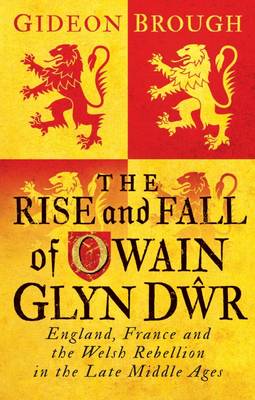The Rise and Fall of Owain Glyn Dwr
England, France and the Welsh Rebellion in the Late Middle Ages

Gideon Brough
(I.B. Tauris), 2017,
313pp., £25 hard, ISBN 978-1-78453-593-3.
Owain Glyn Dwr is a towering figure in Welsh history and military history. Initially a loyal subject of the king of England, he reluctantly took up arms against the Crown he had served leading the last war of Welsh independence (1400-1415). He defeated Henry IV’s army, was a worthy opponent of the king’s champion, the legendary Henry Percy ‘Hotspur’ and last native Welshman to bear the title Prince of Wales. He held court at Harlech and envisioned an independent Welsh state and church with national universities.
Owain erected a rebel state and won international recognition. Once committed to rebellion, he proved surprisingly talented at leading rebel troops against a theoretically vastly superior enemy. Not solely a warrior, he conceived and implemented a strategy which saw his small, poorly-equipped forces repeatedly defeat Crown troops and bring down the apparatus of governance in Wales. Following these achievements, he held native parliaments and established diplomatic contact with surrounding powers. This led to a treaty with France that led to him welcoming French forces to Welsh soil to campaign with the rebels. Owain’s foreign support was fractured by the intrigues of exceptionally talented English diplomats at work in the French court. This created an environment which allowed Crown forces to concentrate on defeating the rebellion in Wales. Although ultimately unsuccessful, Owain emerges from the era as a gifted and honourable leader, giving Wales the hero it needed to sustain its belief in independence from the English crown. Yet Glyn Dwr’s success was short-lived. His defeat at the hands of the English saw the final abandonment of the Welsh cause by France and his own disappearance into an unmarked grave.

